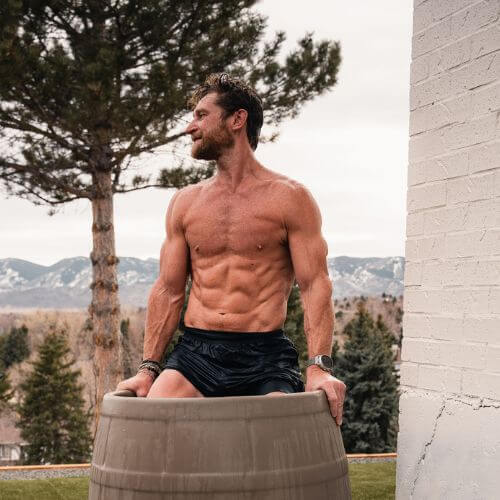The Science Behind Sun Exposure
“When the sun shines, it not only brightens our day: it enlightens us, our soul, cleansing it of the gloominess that the night’s darkness had brought in.”
– Tista Ray
Anyone who knows anyone who listens to The Huberman Podcast has heard that we need to “Get 10-15 minutes of natural sunlight first thing in the morning”.
That audience definitely includes me and likely includes you.
This article shares the science behind:
Leveraging sunlight for health
Protecting your skin from sun exposure.
The Science Behind Light
In my opinion, getting an adequate amount of natural sunlight is one of the most important actions you can take to improve performance and physical/mental health.
Sunlight directly impacts multiple components of our physiology that influence our immune systems, hormones, sleep, mood, and ability to focus.
By this point, we have all heard that we should prioritize 10 minutes of natural light first thing in the morning, but why? The answer is related to your body’s release of cortisol or its primary stress hormone.
Viewing sunlight in the morning helps to spike your body’s early-day cortisol release which can increase your ability to focus, boost your metabolism, as well as positively impact your immune system. Additionally, morning sunlight serves to reset your “circadian rhythm”, or your body’s mechanism for regulating when you rise and sleep, as well as hunger and body temperature.
Cloudiness does have an impact on how much time is required to obtain the benefits of natural light exposure.
On cloudy days, you will need to spend 15-20 minutes outside to experience the positive effects.
When it is full sun all you need is 5-10 minutes.
*If you get up before the sun, leverage bright artificial lights and then get outside as soon the sun has risen.
To maximize the effects of morning sunlight, you should not wear sunglasses or blue light blockers. *Contacts and eyeglasses do not have an impact.
One of the best ways to mitigate many of the negative effects of late-night blue light is by getting outside in the afternoon. Wavelengths of light vary from morning to afternoon, and the yellows and oranges that come through in the afternoon help to communicate with the body’s circadian rhythm that it is evening and time to transition to sleep.
Protecting Yourself From Sun Exposure
So if we are spending all this time outside, how do we protect ourselves from the sun?
If you’ve ever looked online for information about sunscreen, what you found was likely a mix of studies proving that sunscreen will help protect your skin from the sun’s harmful rays, but also claims that sunscreen may do more harm than good.
I constantly go back and forth on whether I think I should be trying to soak up all the sun’s rays or lathering up the sunscreen. I know that too much sun can be harmful, but I also believe a healthy dose of the sun directly on your skin and in your eyes is good for you.
*One of the reasons I love mountain biking in Colorado is that it allows me to ride in and out of the shade, getting a healthy amount of sun exposure, but not to the point where I begin to burn.
In an article published in 2021 by Harvard Medical School, Dr. Jennifer Lin, an assistant professor of dermatology, shared her thoughts on what the science really says about sunscreen:
There are certain chemicals in sunscreen that people should be aware of: specifically ozybenzone, which has been linked to interfere with your body’s natural hormone production.
*Currently scientists are not recommending banning sunscreens with oxybenzone because the research is not yet conclusive, but I try to avoid it as much as possible.
There is zero evidence that sunscreen actually causes skin cancer.
There is solid research to support that sunscreen helps to prevent the three main types of skin cancer: squamous cell carcinoma, basal cell carcinoma, and melanoma.
Everyone does not need to wear sunscreen for skin care prevention: some people are less susceptible to skin cancer than others.
Wearing sunscreen can block the ultraviolet B rays that are responsible for generating vitamin D in the skin.
* The best way to address a vitamin D deficiency or the potential for one, is with routine blood panels. I partake in quarterly blood draws through Blokes that are easy to schedule and I know I am getting top-of-the-line recommendations on supplementation.
There is a danger in assuming that putting on sunscreen by itself is enough to protect you against the sun.

Today’s Optimization
In my twenties, my microbiome was a mess because of bad diet, minimal sun exposure, and a lack of exercise. Over the past 15 years, I have been obsessed with incremental improvements to my health; I consciously redesigned my life to prioritize training, daily sun exposure, and transitioned to a wholefood diet. In the past 12 months since I started working with Blokes, I have felt significant improvements in my overall health and performance.
Blokes is all about health optimization (not sick care) and was created to put us (the patients) back in the driver’s seat. For the most part, I feel pretty good for being in my early forties, but it wasn’t until I started working with Blokes that I was able to crack the code with supplementation. By using blood panels and science to understand my individual vitamin and nutrient deficiencies, I was able to create a supplementation protocol that was personalized to me and my needs. I started taking exactly what I needed, nothing that I didn’t. Today, Blokes is offering Movement Memo subscribers a deal: 20% off using code “EricHinman”
Today’s Movement
Fun in the Sun: Complete 5 Rounds for Time:
- Run 400 Meters
- 30 Burpee Box Jump Overs
- 30 Wall Balls (20/14lbs)




